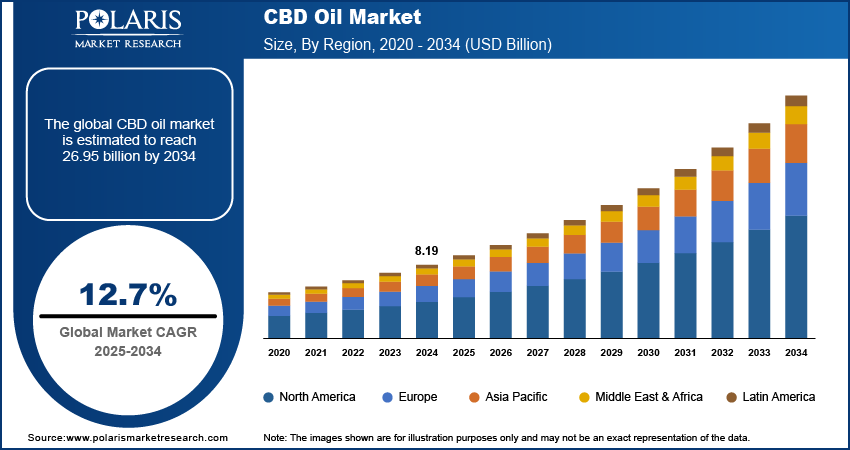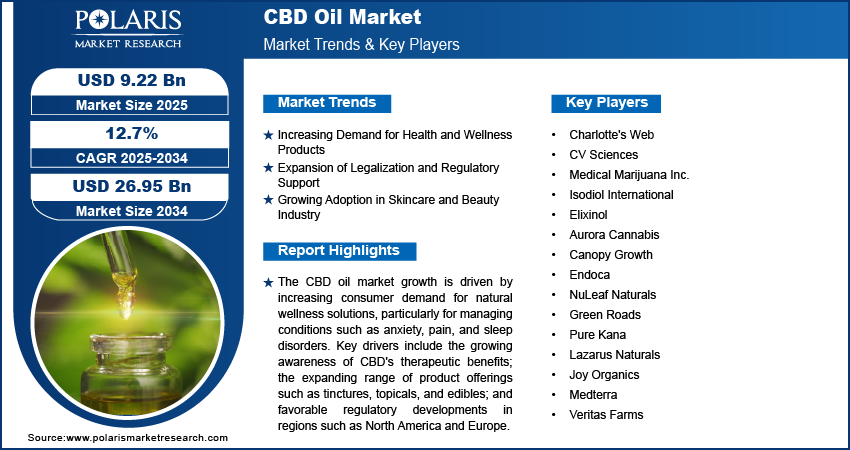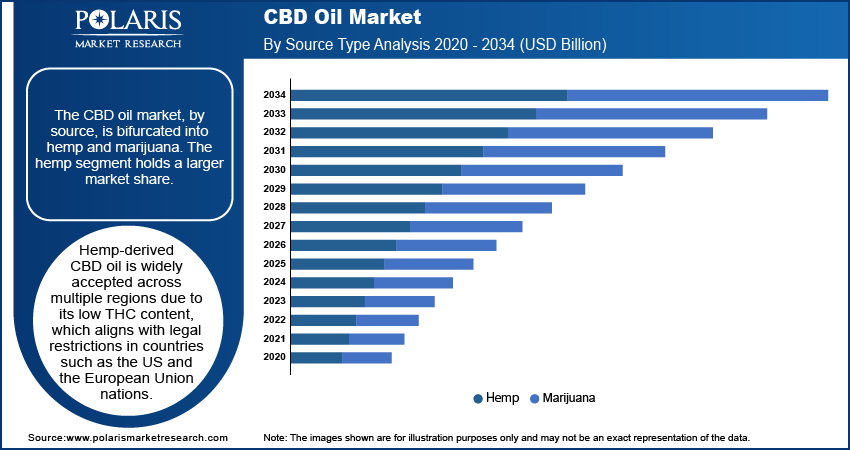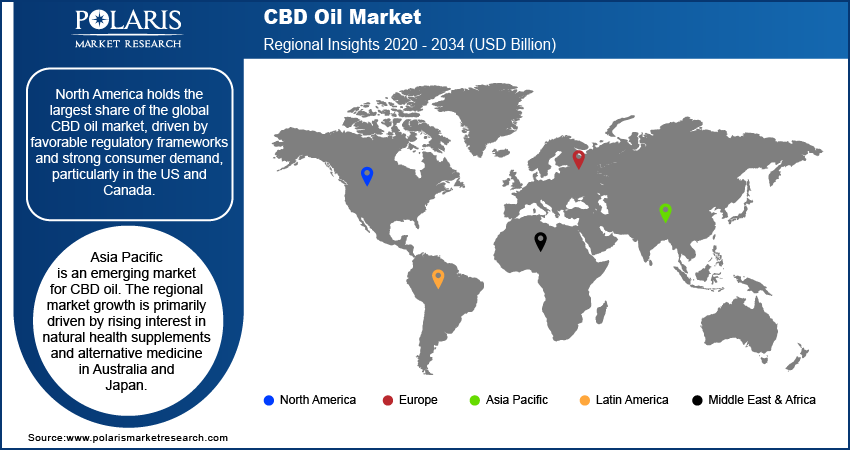
CBD Oil Market Size, Share, Trends, Industry Analysis Report
: By Source (Hemp and Marijuana), Product Type, Product Category, Application, and Region (North America, Europe, Asia Pacific, Latin America, and Middle East & Africa) – Market Forecast, 2025–2034
- Published Date:Dec-2024
- Pages: 118
- Format: PDF
- Report ID: PM1632
- Base Year: 2024
- Historical Data: 2020-2023
Market Overview
The global CBD oil market size was valued at USD 8.19 billion in 2024. The market is projected to grow from USD 9.22 billion in 2025 to USD 26.95 billion by 2034, exhibiting a CAGR of 12.7% during 2025–2034.
The global CBD oil market has experienced steady growth due to the increasing acceptance of cannabidiol-based products in various therapeutic applications. CBD oil, derived from cannabis plants, is utilized for its potential benefits in managing pain, anxiety, epilepsy, and other health conditions. Rising consumer awareness of the medicinal properties of CBD oil, increasing demand for natural products, and expanding legalization of cannabis-derived products in various regions boost the CBD oil market expansion. Key trends shaping the market include ongoing research into the therapeutic uses of CBD, product innovations such as CBD-infused skincare and beverages, and regulatory developments that influence market accessibility and safety standards.

To Understand More About this Research: Request a Free Sample Report
Market Dynamics
Increasing Demand for Health and Wellness Products
Consumers are increasingly seeking natural alternatives to pharmaceutical drugs. Many individuals now consider CBD oil a part of a wellness regimen, recognizing its reported benefits in reducing anxiety, improving sleep, and managing chronic pain. According to the American College of Physicians, around 20% of the US adult population experiences chronic pain, and a growing number of consumers are turning to CBD as a supplementary treatment option. This trend is further propelled by the inclination toward non–invasive health solutions that align with holistic and preventive health approaches. Thus, rising demand for health and wellness products containing natural products is expected to drive the CBD oil market growth during the forecast period.
Expansion of Legalization and Regulatory Support
The expansion of CBD legalization and regulatory support has had a significant impact on the market, particularly in North America and parts of Europe. In the US, the 2018 Farm Bill decriminalized hemp-derived CBD at the federal level, spurring interest and acceptance in the commercial CBD market. According to the European Industrial Hemp Association, more European countries are also adopting policies to regulate CBD, which broadens consumer accessibility and allows for safer products to enter the market. This shift has led to increased innovation, with companies producing a wider range of CBD oil formulations while adhering to established quality and safety standards. Regulatory support continues to drive global market expansion by addressing consumer concerns around product safety and quality.
Growing Adoption in Skincare and Beauty Industry
The skincare and beauty industry has emerged as a significant segment within the CBD oil market. An increasing number of brands are incorporating CBD oil into their products for its potential anti-inflammatory and antioxidant properties. Leading brands are now offering CBD-infused products such as creams, serums, and lotions, catering to consumers who seek plant-based, gentle skincare options. As awareness of CBD’s potential benefits in skincare rises, this trend is expected to strengthen, particularly among younger consumers who prioritize natural and sustainable beauty solutions.

Market Segment Insights
CBD Oil Market Outlook – by Source-Based Insights
The CBD oil market, by source, is segmented into hemp and marijuana. The hemp segment holds a larger market share. Hemp-derived CBD oil is widely accepted across multiple regions due to its low THC content, which aligns with legal restrictions in countries such as the US and the European Union nations. This acceptance has driven demand in wellness, personal care, and nutraceutical applications, where consumers are increasingly turning to hemp-based CBD products for pain relief, anxiety management, and sleep improvement. The widespread availability of hemp-derived CBD products in both specialty and mainstream retail outlets further supports its substantial market share.
In terms of growth, marijuana-derived CBD products are expected to gain traction, particularly in regions where medicinal or recreational marijuana use is legalized. These products, with higher THC content, are commonly used in therapeutic settings to address chronic pain and neurological disorders under medical guidance. As more countries explore the benefits of marijuana-derived cannabinoids, the growth potential for the marijuana segment continues to rise, especially in medical markets where patients seek alternatives to traditional medications. While regulatory complexities persist, favorable policies in certain markets are fostering research and development, enhancing consumer trust, and accelerating demand for marijuana-derived CBD oil in therapeutic applications.
CBD Oil Market Assessment – by Product Type-Based Insights
The CBD oil market, based on product type, is segmented into original and blended. The original segment holds a larger market share. Original CBD oil products contain pure CBD extracts. The products are preferred by consumers seeking the therapeutic effects of cannabidiol without additives, making them popular for medical and wellness applications such as pain management, anxiety relief, and sleep improvement. The demand for these pure formulations is further supported by their availability in multiple forms, including tinctures, capsules, and topicals, which cater to a range of preferences and administration methods. Original CBD products are widely available in specialty CBD stores and mainstream retailers, contributing to their robust market share and reinforcing their presence in the health and wellness segment.
The blended segment is experiencing high growth. Blended CBD products incorporate additional ingredients such as essential oils or herbal extracts. As consumer interest in tailored wellness solutions increases, the demand for blended CBD products rises. These blends are particularly appealing in the skincare and personal care markets, where consumers are drawn to formulations that combine the benefits of CBD with complementary ingredients aimed at enhancing relaxation, energy, or skin health. The growing popularity of CBD-infused cosmetics and wellness products has accelerated innovation within this segment, driving new product launches that leverage blended formulations to address specific consumer needs. With rising awareness of the potential synergistic effects of CBD and other natural ingredients, the blended segment is expected to continue its rapid growth trajectory during the forecast period, especially within the expanding markets for functional and personalized wellness products.
CBD Oil Market Evaluation – by Product Category-Based Insights
The CBD oil market, by product category, is segmented into unflavored and flavored. The unflavored segment accounts for a larger market share, primarily due to their suitability for therapeutic and wellness applications where pure CBD content is prioritized. These products appeal to consumers who prefer minimalistic formulations without additives, catering to those who use CBD oil for its natural properties in managing conditions such as chronic pain, anxiety, and sleep disorders. The unflavored CBD oil is particularly popular among experienced users and patients, as it allows for versatile applications, such as sublingual drops or mixing into food or beverages, without altering the taste. This broad utility has positioned unflavored CBD oils as a mainstay in the health and wellness market, with substantial representation across retail and online platforms.
The flavored CBD oil segment, however, is experiencing rapid growth, driven by increasing demand from new users and consumers seeking an enhanced sensory experience. These products are gaining popularity across younger demographics and casual users, who often prefer flavored options to mask the earthy taste of CBD. With diverse offerings such as mint, citrus, and berry flavors, manufacturers are targeting consumer preferences for more palatable, enjoyable CBD experiences. The growth in flavored CBD products also reflects broader trends in the food & beverage sector, where the infusion of functional ingredients into consumer-friendly formulations is on the rise. As product variety and flavor innovations continue to expand, the flavored CBD oil segment is poised for sustained growth, especially as consumer familiarity with CBD increases.
CBD Oil Market Outlook – by Application-Based Insights
The CBD oil market, in terms of application, is bifurcated into food & beverages, personal care & cosmetics, pharma & nutraceuticals, and others. The pharma & nutraceuticals segment holds the largest CBD oil market share, driven by growing consumer interest in the therapeutic benefits of CBD for conditions such as chronic pain, anxiety, and epilepsy. As CBD gains recognition in medical communities, particularly in North America and parts of Europe, the demand for pharmaceutical-grade and nutraceutical products incorporating CBD oil has increased. These products are often preferred by consumers seeking alternative or complementary health solutions, and they benefit from extensive research and clinical trials supporting CBD’s therapeutic effects. The availability of CBD-based pharmaceuticals and supplements in various forms, such as capsules, tinctures, and sprays, has further established this segment as a dominant player in the market, bolstered by healthcare endorsements and consumer trust.
The personal care & cosmetics segment is registering the highest growth in the CBD oil market, fueled by the rising popularity of natural and plant-based ingredients in beauty and skincare products. CBD’s purported anti-inflammatory and antioxidant properties make it a desirable ingredient for formulations targeting skin health, aging, and inflammation. This trend aligns with consumer preferences for multifunctional, sustainable skincare products, driving the integration of CBD into items such as creams, serums, and masks. With an increasing number of brands introducing CBD-infused personal care lines and consumers embracing wellness-focused beauty routines, the personal care and cosmetics segment is expected to expand rapidly in the coming years, supported by product innovation and demand across a range of demographics.

Regional Insights
By region, the study provides CBD oil market insights into North America, Europe, Asia Pacific, Latin America, and the Middle East & Africa. North America holds the largest share of the global CBD oil market revenue, driven by favorable regulatory frameworks and strong consumer demand, particularly in the US and Canada. The 2018 Farm Bill in the US, which legalized hemp-derived CBD, has significantly accelerated market growth by enabling widespread distribution and acceptance of CBD products across states. High consumer awareness and demand for natural wellness solutions, along with an advanced retail infrastructure, further support CBD oil market development in the region. Europe is also a key market due to evolving CBD regulations and a growing preference for natural health products, whereas Asia Pacific is gradually emerging as a potential growth area, especially in countries such as Australia and Japan, where interest in wellness trends and alternative therapies is on the rise.
In Europe, the CBD oil market is steadily expanding as regulatory frameworks evolve and consumer demand for natural wellness products grows. Countries such as the UK, Germany, and Switzerland lead in CBD product consumption due to progressive regulations that allow for the sale of CBD-based products with strict quality controls. Consumer interest in plant-based health solutions, particularly for managing stress, sleep, and skincare concerns, is driving demand for CBD oil across various applications, from pharmaceuticals to personal care. As European regulations around CBD harmonize, this market is expected to see continued growth, supported by increasing consumer awareness and retailer interest.
Asia Pacific has an emerging market for CBD oil, with growth primarily driven by Australia and Japan. In these countries, interest in natural health supplements and alternative medicine is gaining traction. Australia, in particular, has established regulatory pathways for medicinal cannabis, allowing for greater accessibility and consumer acceptance of CBD products. Japan is also witnessing a gradual increase in CBD usage, with CBD oils and cosmetics entering wellness and beauty markets due to growing consumer interest in anti-stress and skincare solutions. At the same time, acceptance across Asia is limited due to strict regulations. Further, ongoing discussions on cannabis reform in select countries indicate potential market expansion in the coming years.

Key Players and Competitive Insights
Key players in the CBD oil market include a diverse range of companies focused on various applications, from healthcare and wellness to cosmetics. Notable active companies are Charlotte’s Web, CV Sciences, Medical Marijuana Inc., Isodiol International, and Elixinol. They are recognized for their established product lines and dedication to quality standards. Companies such as Aurora Cannabis and Canopy Growth, which have dedicated CBD oil divisions, are also prominent in the market. Other active companies include Endoca, NuLeaf Naturals, Green Roads, Pure Kana, Lazarus Naturals, and Joy Organics, each catering to specific market needs and consumer preferences. Additionally, companies such as Medterra and Veritas Farms maintain a strong market presence with a focus on transparency and sustainable production practices.
The competitive landscape of the CBD oil market is characterized by product diversification and a focus on quality as companies strive to meet evolving regulatory standards and consumer expectations. Many players differentiate themselves by offering full-spectrum and broad-spectrum CBD oil formulations, as well as isolated CBD, to cater to a range of consumer preferences. For example, Charlotte’s Web and Green Roads offer products that prioritize traceability and potency, addressing consumer concerns around safety and efficacy. The presence of companies specializing in specific applications, such as personal care by Elixinol and health supplements by Medterra, highlights the market’s diverse approach to meeting consumer demands.
Companies are also increasingly focused on innovation and research, leveraging proprietary formulations and organic sourcing to appeal to health-conscious consumers. Many companies are vertically integrated, controlling production from cultivation to distribution, which enhances product consistency and aligns with the growing demand for transparent sourcing. As consumer interest in natural wellness products continues to expand, companies investing in high-quality ingredients and unique formulations are well-positioned to strengthen their competitive standing in the market.
Charlotte’s Web a CBD company, is known for its range of hemp-derived CBD products, including oils, gummies, and capsules. The company is widely recognized for its commitment to transparency and quality control, with a focus on using US-grown, non-GMO hemp.
CV Sciences is another key player in the CBD market offers a variety of CBD-based wellness products under its PlusCBD brand, which includes oils, balms, capsules, and gummies. The company emphasizes quality assurance and research, with a focus on product safety and consumer education.
Key Companies
- Charlotte's Web
- CV Sciences
- Medical Marijuana Inc.
- Isodiol International
- Elixinol
- Aurora Cannabis
- Canopy Growth
- Endoca
- NuLeaf Naturals
- Green Roads
- Pure Kana
- Lazarus Naturals
- Joy Organics
- Medterra
- Veritas Farms
CBD Oil Industry Developments
- In June 2024, Charlotte's Web Holdings, Inc. announced that its products, including CBD oils, are available at Walmart.
- In October 2024, Aurora Cannabis Inc., in conjunction with MedReleaf Australia, announced an enhanced product range of premium medical cannabis oil in Australia.
Market Segmentation
By Source Outlook
- Hemp
- Marijuana
By Product Type Outlook
- Original
- Blended
By Product Category Outlook
- Unflavored
- Flavored
By Application Outlook
- Food & Beverages
- Personal Care & Cosmetics
- Pharma & Nutraceuticals
- Others
By Regional Outlook
- North America
- US
- Canada
- Europe
- Germany
- France
- UK
- Italy
- Spain
- Netherlands
- Russia
- Rest of Europe
- Asia Pacific
- China
- Japan
- India
- Malaysia
- South Korea
- Indonesia
- Australia
- Vietnam
- Rest of Asia Pacific
- Middle East & Africa
- Saudi Arabia
- UAE
- Israel
- South Africa
- Rest of Middle East & Africa
- Latin America
- Mexico
- Brazil
- Argentina
- Rest of Latin America
Report Scope
|
Report Attributes |
Details |
|
Market Size Value in 2024 |
USD 8.19 billion |
|
Market Size Value in 2025 |
USD 9.22 billion |
|
Revenue Forecast by 2034 |
USD 26.95 billion |
|
CAGR |
12.7% from 2025 to 2034 |
|
Base Year |
2024 |
|
Historical Data |
2020–2023 |
|
Forecast Period |
2025–2034 |
|
Quantitative Units |
Revenue in USD billion and CAGR from 2025 to 2034 |
|
Report Coverage |
Revenue Forecast, Market Competitive Landscape, Growth Factors, and Trends |
|
Segments Covered |
|
|
Regional Scope |
|
|
Competitive Landscape |
|
|
Report Format |
|
|
Customization |
Report customization as per your requirements with respect to countries, regions, and segmentation. |
FAQ's
The global CBD oil market size was valued at USD 8.19 billion in 2024 and is projected to grow to USD 26.95 billion by 2034.
The global market is projected to register a CAGR of 12.7% during 2025–2034.
North America accounted for the largest market share in 2024
The CBD oil market includes a diverse range of companies focused on various applications, from healthcare and wellness to cosmetics. Notable active companies are Charlotte’s Web, CV Sciences, Medical Marijuana Inc., Isodiol International, and Elixinol, which are recognized for their established product lines and dedication to quality standards.
The hemp segment accounted for the largest market share in 2024.
The original segment accounted for the largest CBD oil market share in 2024.
CBD oil is a natural product derived from the cannabis plant, specifically from hemp. The oil contains high levels of cannabidiol (CBD) and low levels of tetrahydrocannabinol (THC), the psychoactive compound in cannabis. It is known for its potential health benefits, such as promoting relaxation, reducing anxiety, alleviating pain, and supporting overall well-being. Unlike THC, CBD does not produce a "high" effect, making it a popular choice for individuals seeking the therapeutic effects of cannabis without the intoxicating effects. CBD oil is commonly used in various forms, including tinctures, capsules, topicals, and edibles, for medical and wellness purposes.
A few key trends in the CBD oil market are described below: Growing Consumer Demand for Wellness Products: Increased interest in natural, plant-based solutions for stress, pain, and sleep issues. Expansion of Product Offerings: Introduction of innovative products, such as CBD-infused cosmetics, beverages, and pet care products. Focus on Transparency and Quality: Consumers are demanding more transparency regarding sourcing, lab testing, and product ingredients. Regulatory Developments: Ongoing evolution of regulatory frameworks in various regions, influencing market growth and consumer trust.
A new company entering the CBD oil market must focus on product innovation, particularly in offering unique formulations such as CBD blends with other natural wellness ingredients, targeting specific health concerns such as stress, sleep, or pain. Ensuring transparency through third-party lab testing and clear labeling will help build consumer trust. Emphasizing sustainable sourcing and eco-friendly packaging can also appeal to the growing segment of environmentally conscious consumers. Additionally, leveraging e-commerce and digital marketing strategies, including influencer collaborations, can expand reach and enhance brand visibility.
Companies manufacturing, distributing, or purchasing CBD oil and related products and other consulting firms must buy the report.
